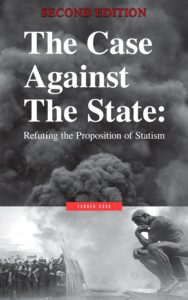While many may view religion and politics as separate entities, there are undeniable similarities between the two, particularly when it comes to the fervent belief and devotion that individuals have towards their government and its ideologies.
Understanding the Concept of Political Statism
Let’s dive into the heart of what political statism actually entails. It’s a belief system that places the state, or the government, squarely at the center of governance. The government, in this model, is seen as the primary architect of societal and economic progress. Statists, as the proponents of this model are called, advocate for the government to have a firm grip on economic planning and societal order maintenance.
They often argue that to uphold overall societal harmony, the government may need to restrict certain civil liberties. Quite the contrast to libertarian ideologies that tout minimal governmental interference as the key to freedom and progress. So, statism isn’t just about a bigger government. It’s about a government that actively shapes and directs the trajectory of a nation’s development.
The Shared Tenets Between Statism and Religion
When we closely inspect the fabric of political statism and religion, we stumble upon a fascinating realization, a commonality of fundamental tenets. The underpinning principles that both spheres are built upon are uncannily alike, and the respect and deference shown to these principles by their respective followers further deepen the similarities. Both domains are grounded on a shared set of convictions and rules, which form the bedrock of their ideologies.
A hallmark of these shared tenets is a deep-seated belief in a supreme power. In the religious realm, this is typically a deity or divine power. For statism, it’s the state or government that takes the position of the supreme authority. This hierarchical construct allocates immense power to the top entity, making it the ultimate source of guidance and decision-making.
Beyond the hierarchical structure, there is a shared moral framework as well. In both religion and statism, there’s a strong adherence to a prescribed set of norms and values that govern how individuals should act and interact within their communities. This can range from ethical mandates to codes of conduct and everything in between.
Indeed, the shared tenets between statism and religion stretch beyond the surface level. They root themselves in foundational beliefs, manifesting in a reverence for a supreme entity and adherence to a common moral compass.
The Ritualistic Nature of Political Statism
Digging deeper into the comparison between political statism and religion, we encounter another striking similarity, the presence of ritualistic behaviors. Rituals are acts of symbolic significance performed in a prescribed order and manner, often at specific times. They’re a universal feature in all religions, serving as powerful markers of faith, dedication, and identity.
Let’s transpose this concept to political statism. Just as a devout Catholic may attend Sunday mass or a practicing Muslim observes the five daily prayers, so too does a statist partake in certain rituals. These can take the shape of civic duties like casting a vote during elections, rallying support at political gatherings, or even the simple, everyday act of standing in respect during the national anthem. Each of these actions serves as a public affirmation of their commitment and allegiance to the state.
Similar to religious rituals, these acts are not merely empty gestures. Instead, they are filled with meaning, providing statists with a sense of purpose and unity. They function as a tangible expression of their faith in the state and its authority, cementing their consent and loyalty.
Therefore, just as rituals are central to the practice and expression of religion, so too do they play a crucial role in the realm of political statism. By participating in these rituals, statists are constantly reinforcing their belief in the state’s authority and their own role within this political system.

> Check Current Book Prices <
The Messiah Syndrome in Political Statism
Unveiling yet another striking parallel between statism and religion is the concept of the ‘Messiah Syndrome.’ This phenomenon refers to the deep-rooted belief in a single figure or entity that possesses the power to effect monumental change, essentially bringing about salvation.
Drawing comparisons from religious narratives, many faiths prophesy the advent of a messiah or a savior; a divine entity destined to deliver salvation and restore balance. This belief can serve as a source of hope, strength, and solace for devotees.
In the context of political statism, this concept finds its manifestation quite differently. The ‘messiah’ in this scenario could emerge in the guise of a charismatic leader with a magnetic persona or a powerful government brandishing bold, transformative policies. These figures or entities often pledge to instigate a golden age of peace, prosperity, and progression, drawing ardent followers who harbor a zealous belief in their ability to effectuate these promised changes.
Just like religious followers awaiting their prophesied savior, statists place their faith in the ability of their chosen leader or government to guide their nation toward a utopian vision. This deep-seated faith, often fueled by the charisma of the leader or the promise of the government, solidifies the parallel between political statism and religious beliefs in the context of the ‘Messiah Syndrome’.

Faith and Fervor: Emotional Engagement in Political Statism
Just as the heartstrings of believers resonate with the pulse of their faith, so too does the core of a statist vibrate with a passion for their political system. This emotional connect forms a key facet of the interplay between political statism and religion. It’s not just about policy or commandments; it’s about the emotional capital that is invested.
Consider the thrall of a spiritual congregation or the palpable energy at a political rally. They both radiate a fervor that goes beyond the ordinary. They embody faith. And this faith isn’t casual or passive; it’s fervent, animated, and profoundly personal. The belief in the state’s capacity to engineer societal harmony and economic prosperity, as advocated by statists, is accompanied by an intense emotional engagement that mirrors religious fervor.
This emotion-laden involvement is further amplified by a deep sense of belonging. Being part of a collective, whether it’s a religious group or a political ideology, can foster a strong sense of identity and camaraderie. The shared beliefs, aspirations, and rituals cultivate a collective spirit, adding emotional depth to the adherence to statism. It’s like being part of a broader family, tied together not by blood, but by shared political beliefs and goals.
However, this emotional engagement often leads to a strong resistance against questioning or criticizing the state. Much like religious devotees, statists can also display a degree of blind faith and unwavering loyalty towards their chosen political system. This faith in the state’s authority, reinforced by emotional fervor, serves to further highlight the parallels between religious faith and political statism.
The Dark Side: Extremism in Statism and Religion
While the parallels between statism and religion can help facilitate societal order and conformity, they can also harbor the seeds of potential extremes. In the same way that religious zeal can unfortunately tip into fundamentalism, the power vested in the state can similarly edge towards despotism if left unchecked. This extremity of statism unfurls into totalitarianism, a political system where the state seizes absolute control over all dimensions of life, both public and private.
This unchecked authority can easily morph into a breeding ground for oppressive practices, human rights violations, and even acts of violence. It’s a sinister twist to the belief in a supreme power, whether divine or governmental. The fervor that once bound a community together can gradually fray into fear and silence, as dissent is smothered and individual liberties are curtailed. It’s a dark alley where the ideals of societal harmony and economic prosperity are shrouded by the chilling cloak of absolutism.
In the end, the parallels between statism and religion serve as a double-edged sword. On one hand, they forge unity, identity, and shared goals. On the other, they warn us of the dangers of blind faith, unchecked power, and fervor tipping into extremism. Thus, these comparisons underscore the critical importance of maintaining a balance between belief in a higher power and preserving individual freedoms and rights. This delicate equilibrium is essential for ensuring that the ideal of statism doesn’t devolve into a harsh reality of totalitarianism, which it almost always does.






